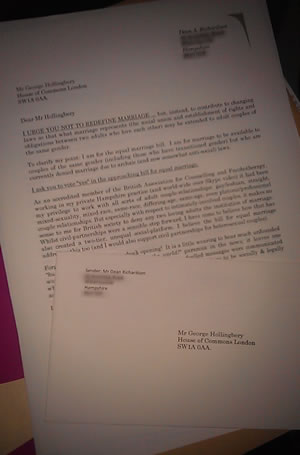On Thursday 24th January, 2013, the British government’s Marriage (Same Sex Couples) Bill for England and Wales was officially introduced to the House of Commons by Culture Secretary Maria Miller.
Great – I thought – now things are progressing to address the unequal, two-tier situation regarding those who have access to civil-partnerships, and those who have access to marriage.
But my mind was bugging me a bit. Although I am a public supporter of Equal Marriage, and I tweet and Facebook about it, and my counselling practice supports it, I haven’t actually taken any direct action with regards to getting the law changed.
I know that writing to ones MP can be a common approach, and I had not done that. Something was holding me back.
So, today, using good CBT (Cognitive Behavioural Therapy) skills, I went through a small project of breaking down a task into smaller, manageable chunks … and I thought I’d share my process in case it helps others who might also wish to write to their MPs … if only they knew how.
Step 1 – Who is my Member of Parliament?
This turned out to be easy – visit “They Work for You” at http://www.theyworkforyou.com and pop in your postcode.
Voila – your MP!
Step 2 – What do I write?
I chose to take a slightly tongue-in-cheek approach to my opening. It’s something I learned ages ago when one needs to get someone’s attention at the beginning of a presentation. So I opened by redefining what others are saying about redefining marriage 😉
Other than that, I choose to take an approach that communicated my professional beliefs as a couple counsellor, practising in Hampshire and on Skype. (BACP members – pay attention that we must not use our membership of BACP to communicate or give the impression that BACP endorses us, or our beliefs or practice, in any way. I included my membership as it was relevant to my position in my letter to my MP).
I’ve included my letter below in case it inspires you to write you own (please use your own words and write from your own points of view – it comes across lots better than a rubber-stamp letter).
[learn_more caption=”Here’s a copy of what I wrote to Mr George Hollingbery”]
Mr George Hollingbery, House of Commons London, SW1A 0AA.
Dear Mr Hollingbery
I URGE YOU NOT TO REDEFINE MARRIAGE … but, instead, to contribute to changing laws so that what marriage represents (the social union and establishment of rights and obligations between two adults who love each other) may be extended to adult couples of the same gender.
To clarify my point: I am for the equal marriage bill. I am for marriage to be available to couples of the same gender (including those who have transitioned gender) but who are currently denied marriage due to archaic (and now somewhat anti-social) laws.
I ask you to vote “yes” in the approaching bill for equal marriage.
As an accredited member of the British Association for Counselling and Psychotherapy, working in my private Hampshire practice (and world-wide over Skype video) it had been my privilege to work with all sorts of adult couple-relationships: gay/lesbian, straight, mixed-sexuality, mixed-race, same-race, differing-age, same-age, even platonic/professional couple relationships. But especially with respect to intimately-involved couples, it makes no sense to me for British society to deny any two loving adults the institution of marriage. Whilst civil-partnerships were a sensible step forward, I have come to believe how that has also created a two-tier, unequal social-platform. I believe the bill for equal marriage addresses this too (and I would also support civil partnerships for heterosexual couples).
Forgive my slightly tongue-in-cheek opening! It is a little wearing to hear much unfounded “but redefining marriage will destroy the world!” paranoia in the news; it leaves one wondering if, historically, the same unfounded fear-fuelled messages were communicated when couples of different skin colours wished their partnerships to be socially & legally accepted.
I hope you will be a part of this courageous bill to redress the current inequality of marriage and I thank you for your attention to this letter.
Yours sincerely,
Dean A. Richardson, MBACP(accred)
[/learn_more]
Step 3 – How do I get my message to my MP?
Easy … in step 1 there’s a link to a page that allows you to send a message directly to your MP (via email I think).
Look for the link WriteToThem.com – write your message (politely and to the point) and send it off.
NB – I began using this form, but as I neared the end of my message I realised that I actually wanted to print my letter on quality paper, put into a nicely prepared envelope and send it through the mail. If I’m going to ask my MP to pay attention to how important this matter is, I wanted the quality of my message to get through in the best way as it could. Just a personal thing 🙂
Step 4 – Send … and wait for a reply.
We’re not guaranteed to receive the reply we want from our MPs.
Many other people will have written with other views – and an MP must do his or her best to represent everyone (though, in reality he/she may try to represent the majority as this is what got him/her into his job in the first place … and will likely put him/her back there in the next election).
But, if we remember that our MPs are in parliament to represent us, not to simply represent their own personal views, then the more people who support Equal Marriage who write to their MPs, the better the chances that laws will be changed for the better.




